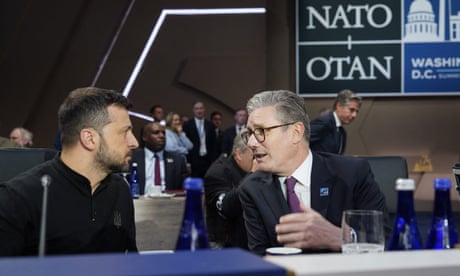It’s worrying to see the prime minister cheerleading for war. Will Ukraine turn into Starmer’s Iraq?

The Nato summit offered a chance to work towards resolution. But instead, Starmer talked about long-range missiles
W
Leaders should beware the unexpected. When Tony Blair entered No 10 in 1997, few could have imagined he would one day leave it under a dark cloud marked “Iraq”. Britain’s war in Iraq was dressed up – like Starmer’s missiles – as vital to national security. In reality it was a bombastic gesture intended to make Blair look good in American eyes. Labour governments often feel the need to add trumpets and drums to their image.
Ever since Russia’s full-scale invasion of Ukraine in 2022 British politicians have used it as a stage on which to parade their toughness, most ludicrously Boris Johnson. From the start, Volodymyr Zelenskiy has collaborated. The politicians go over the top in demanding “total victory” against Russia – one they know is implausible. Zelenskiy embraces them warmly and sends them the bill.
One condition that Nato has emphasised throughout is that Ukraine’s war be strictly defensive. Nothing should escalate it beyond the country’s borders. Vladimir Putin should not be provoked into a wider conflict. This has meant no Nato weapons should be used against targets deep inside Russia. This discipline has mercifully held.
Starmer apparently disagrees with it. As he went to Washington last week, he might have been ordering the Light Brigade into action against Russia’s guns. In fact, any change in Nato’s weapons deployment requires a collective decision. But Zelenskiy has already welcomed the sign that a Nato member is clearly happy to escalate the war, and is ready to pay billions to do so. Some Nato members, such as France and Germany, have already allowed their non-Nato military aid contributions to be used to strike far into Russia; the US has declined to allow this.
This is already Nato’s war. When, two years ago, the initial Russian advance on Kyiv was halted, it would have ended in some messy compromise, like that of Donbas in 2014. It has only continued because Nato, of which Ukraine is not a member, has offered to fund a Zelenskiy victory. So long as he was ready to see tens of thousands of his conscripts die, the west was ready to pay.
As this awful war continues, even as it stalemates, western defence interests gather round it like moths to a flame. Nato special forces now in Ukraine could mutate into regular ones, as happened disastrously in Afghanistan. Putin, as long as he lasts, has the power to lay waste the great cities of Ukraine and unleash at least a minor nuclear trauma. Nato may be bludgeoned into escalating its response.
Non-military sanctions against Russia have failed. They have deterred no one, and have solidified Putin. They have punished western economies, cohered autocracies and cut Russia off from networks of persuasion or contact. Even the back channels so vital in the Cuban missile and Andropov crises have apparently weakened.
There is no evidence that Putin was ever seeking a hot war with the west. He made a terrible mistake in marching on Kyiv, one from which he needs somehow to be extricated. But when peace-making is so neglected an art – when it is now derided as appeasement – it is depressing that a British prime minister should be a cheerleader for war. Is Ukraine really to be Starmer’s Iraq?
-
Simon Jenkins is a Guardian columni
st


Geen opmerkingen:
Een reactie posten
Opmerking: Alleen leden van deze blog kunnen een reactie posten.